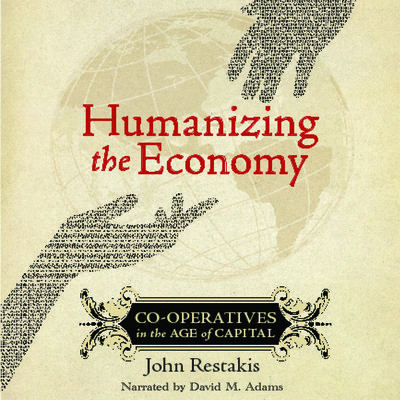Humanizing the Economy describes an alternative economic system and accompanies it with examples of how such a system is being built around the world. Beginning with a critique of capitalism, author John Restakis argues that before the emergence of this economic order, market transactions were embedded in social relations that served the common good. But the industrial revolution brought a dramatic shift in how individuals related to one another and understood their role in community life.
Humanizing the Economy describes an alternative economic system and accompanies it with examples of how such a system is being built around the world. Beginning with a critique of capitalism, author John Restakis argues that before the emergence of this economic order, market transactions were embedded in social relations that served the common good. But the industrial revolution brought a dramatic shift in how individuals related to one another and understood their role in community life. Profit became the motivation of business owners, workers became atomized individuals contributing to production processes, and those buying goods and services became insatiable, self-focused consumers. This devastating rupture between economic and social relations has manifested itself worldwide in personal unhappiness, declining social capital, high levels of poverty, and environmental destruction. Such a critique may be familiar to Alternatives readers.
Where Restakis breaks new ground is by offering co-operation as a real and pragmatic solution to the negative consequences of the globalized capitalist system. He focuses primarily on formal co-operative organizations: Enterprises that are owned by members, each of whom invests an equal amount of equity in the business and each of whom has an equal say in decision making.
The author’s specific focus is on co-operatives as they have emerged internationally. Restakis, the executive director of the BC Co-operative Association and a consultant on development projects around the world, takes readers on a tour of seven countries, and explores a wide range of economic sectors. Of particular relevance to this journal’s audience are the two chapters on the production, distribution and consumption of sustainable foods.
In Japan, Restakis introduces us to the Seikatsu Club, a co-operative enterprise with 300,000 members that purchases food directly from farmers. Seikatsu has strict environmental practices to which growers willingly adhere. Seikatsu and their producer partners are also actively involved in the fight against the genetic modification of food. In Sri Lanka, the author tells us about the Small Organic Farmers’ Association, a co-operative whose members grow organic tea for the fair trade market. In addition to removing producers’ exposure to agrichemicals and providing higher prices for tea, the association invests in wider-reaching projects such as building a community centre and improving local drinking water. In both examples, co-operatives use market relations while advancing community well-being and sustainable development.
Co-operation is also used more broadly in the book. Restakis argues that the emergence of a more humane economic system requires the transformation of global institutions such as the International Monetary Fund and the World Bank. Co-operation, in this sense, means a move to democratic participation within these institutions by all countries, involving both government representatives and actors from civil society.
Restakis writes beautifully. His seven examples of co-operatives in practice are particularly poignant, providing socio-historical information on the regions in which they are located. He also includes records of conversations with co-operative members regarding how these organizations have had an impact on their lives, and descriptions of local sights and sounds so vivid that you feel you are on location.
It is these real-world examples that may most inspire environmental activists, as they illustrate that market relations can serve environmental and social goals. This is a concrete form of economic activity that seems worth replicating, but because the author concentrates on co-operatives as they appear internationally, readers may feel that the model is better suited to regions outside of Canada and the United States. Restakis could have paired his material on the Seikatsu Club with the flourishing natural foods co-operatives in the US, or coupled the story of the tea farmers in Sri Lanka with the Ontario producers who formed the farmer-owned Organic Meadow. If that had been done, readers could have more clearly understood that co-operatives have the potential to humanize the economy and create a greener world.
Restakis also largely overlooks some of the tensions and contradictions within the co-operative movement. Not all co-operatives follow sustainable practices, nor do they all treat workers equitably or adhere to truly democratic practices. The adoption of the co-operative form never guarantees that these things will take place. After all, some co-operatives operate oil refineries or are immersed in agribusiness. It is the co-operative form combined with the hard work and commitment of its members to a moral and sustainable economy that makes the difference.
Although the book was written for community developers, the volume is appropriate for undergraduate or graduate students in environmental studies, community studies or business.
Humanizing the Economy: Co-operatives in the Age of Capital, John Restakis, Gabriola Island, British Columbia: New Society Publishers, 2010, 228 pages
Subscribe now to get more book reviews in your mailbox!
Reviewer Information
Andrew Heintzman is the co-founder of Investeco, Canada’s first environmental investment company, and author of The New Entrepreneurs (Anansi 2010).













